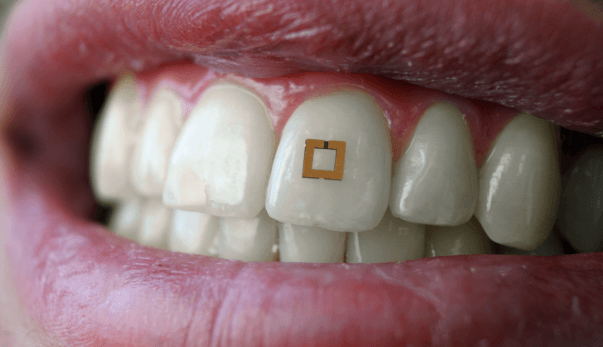Tooth sensor checks your diet
March 29, 2018
on
on

A team from the School of Engineering at Tufts University has developed a miniature bendy 2 x 2 mm sensor that glues directly onto a wearers tooth, and can measure the concentration of specific chemicals in the mouth. The sensor is sensitive to levels of glucose, salt and alcohol. It’s powered by energy harvested from an external transmitter signal and provides measurement information by modulating the reflected RF signal. New sensors are also under development capable of analyzing a much wider range of substances allowing a more complete picture of nutritional intake to be provided.
Sensors previously developed for this sort of application have been impractical because of cabling and other difficulties. On top of that, all those digestive juices sloshing around in the mouth makes a fairly hostile environment for delicate electronic components made using conventional materials, resulting in corrosion and poor sensor life. The novel wireless sensor is not only small, but flexible so it conforms to the surface on which it is glued. The sensor is made up of three layers: the middle layer is bioactive to detect the chemicals. The two outer layers consist of a thin gold foil, which serve as the antennae to receive and modulate the reflected control signals.
The sensor is selective in the sense that the concentration of salt or ethanol, etc. alters its electrical characteristics, thereby changing its RF absorption characteristics and altering the reflected wave pattern which can then be evaluated by an external computer system. The authors have published their research report entitled ‘Functional, RF-trilayer sensors for tooth-mounted, wireless monitoring of oral cavity and food consumption’ in the journal Advanced Materials.
Sensors previously developed for this sort of application have been impractical because of cabling and other difficulties. On top of that, all those digestive juices sloshing around in the mouth makes a fairly hostile environment for delicate electronic components made using conventional materials, resulting in corrosion and poor sensor life. The novel wireless sensor is not only small, but flexible so it conforms to the surface on which it is glued. The sensor is made up of three layers: the middle layer is bioactive to detect the chemicals. The two outer layers consist of a thin gold foil, which serve as the antennae to receive and modulate the reflected control signals.
The sensor is selective in the sense that the concentration of salt or ethanol, etc. alters its electrical characteristics, thereby changing its RF absorption characteristics and altering the reflected wave pattern which can then be evaluated by an external computer system. The authors have published their research report entitled ‘Functional, RF-trilayer sensors for tooth-mounted, wireless monitoring of oral cavity and food consumption’ in the journal Advanced Materials.
Read full article
Hide full article


Discussion (0 comments)